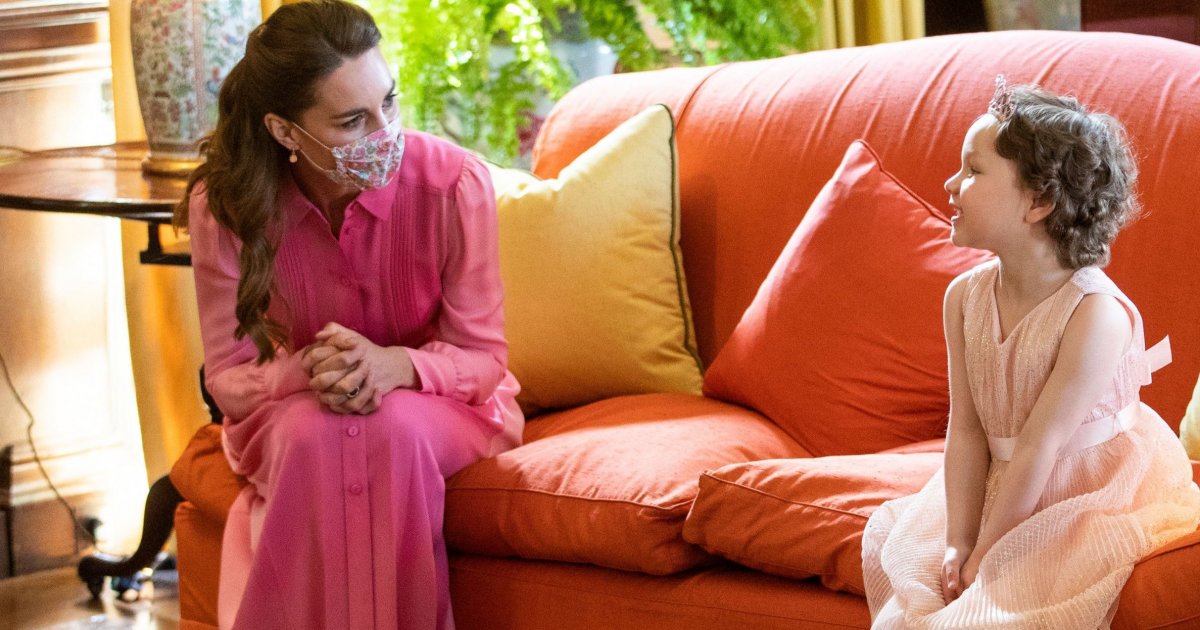Mila Gets a Special Visit
- Duchess Kate Middleton meets with 6-year-old “best friend” Mila Sneddon.
- Mila was diagnosed with Acute Lymphoblastic Leukemia (ALL) at age 4. ALL is a type of cancer of the blood and bone marrow. Leukemia is the most common cancer diagnosed in children and teens.
- Keeping a positive attitude through cancer can help make the journey easier. When it comes to younger cancer patients, it’s important for parents and family members to try and keep a positive attitude around them as much as possible.
Read MoreThe Duchess of Cambridge keeps her promise to five-year-old cancer patient Mila Sneddon, who wanted to meet a princess wearing pink. pic.twitter.com/oXNFtSC17B
Richard Palmer (@RoyalReporter) May 27, 2021
Very grateful to receive a beautiful handwritten letter from @KensingtonRoyal. Such a beautiful keepsake for Mila to look back on for many years to come (content of which will not be disclosed) such a lovely gesture thank you Catherine Duchess of Cambridgeâ¤ï¸ pic.twitter.com/kBvCj0Mgyc
Lynda Sneddon (@SneddonLynda) May 10, 2022
“The Duchess promised to meet Mila and wear a pink dress for her,” says Mila’s mother Lynda. Mila refers to the duchess as her “best friend”, and has been hanging out with her for a little over a year now.
View this post on Instagram
Mila's mom, Lynda, shared the news of the thoughtful gesture on Twitter, writing, "Very grateful to receive a beautiful handwritten letter from @KensingtonRoyal…"
She continues, "…Such a beautiful keepsake for Mila to look back on for many years to come (content of which will not be disclosed) such a lovely gesture thank you Catherine Duchess of Cambridge."
Mila, who's from Falkirk, Scotland, first captured Middleton's heart and mind when the Duchess of Cambridge saw a photo of Mila isolating during chemo. The Daily Mail reports, "The schoolgirl met Kate Middleton twice last year after the royal spotted the photo of the little girl in lockdown in March 2020; the image saw her gazing at her father Scott, who had been forced to move out of the family home to protect his daughter, through a window."
Mila’s Leukemia Journey
Mila Sneddon was diagnosed with acute lymphoblastic leukemia (ALL) in November 2019 and spent two years getting chemotherapy treatment.
Mila triumphantly beat her cancer and got to ring the cancer bell at Team Jack Cancer Centre recently. She was pictured getting chemo to treat her acute lymphoblastic leukemia, which is how Middleton was made aware of her.
Acute Lymphoblastic Leukemia (ALL) is a type of cancer of the blood and bone marrow. Leukemia is the most common cancer diagnosed in children and teens. It accounts for almost 1 out of 3 cancers. On the whole, though, pediatric leukemia is a rare disease.
The American Cancer Society says that approximately 3 out of 4 leukemias among children and teens are acute lymphocytic leukemia (ALL). Most of the remaining cases are acute myeloid leukemia (AML). ALL is most common in early childhood, peaking between 2 and 5 years of age, says the ACS.
In an earlier interview, Dr. Olalekan Oluwole, a hematologist with Vanderbilt University Medical Center, explains the steps that may follow an Acute Lymphoblastic Leukemia (ALL) diagnosis. He says, "Cancer is a really life-changing diagnosis. And we would like our patients to know that they don't have to feel that they are in there on their own. We have case managers that can help. We have social workers."
"In fact, we have a navigator because sometimes they have blood test here, they see a doctor there, they get chemo there, they do a lumbar puncture. It can be completely overwhelming. So we actually have people that can help them find their way around the hospital," he says.
What Is Acute Lymphoblastic Leukemia ALL?
Mila’s Happiness
Mila's mother Lynda has said that their family is keeping a positive attitude into her remission and being cancer-free. Their family is "overjoyed and ecstatic" for Mila being cancer-free.
Keeping a positive attitude through cancer can positively impact one's prognosis, experts tell SurvivorNet, based on anecdotal evidence. Dr. Zuri Murrell from Cedars-Sinai Medical Center says, "My patients who thrive, even with stage 4 cancer, from the time that they, about a month after they're diagnosed, I kind of am pretty good at seeing who is going to be OK."
"Now doesn't that mean I'm good at saying that the cancer won't grow," the doctor explains. "But I'm pretty good at telling what kind of patient are going to still have this attitude and probably going to live the longest, even with bad, bad disease. And those are patients who, they have gratitude in life."
Learn more about SurvivorNet's rigorous medical review process.


